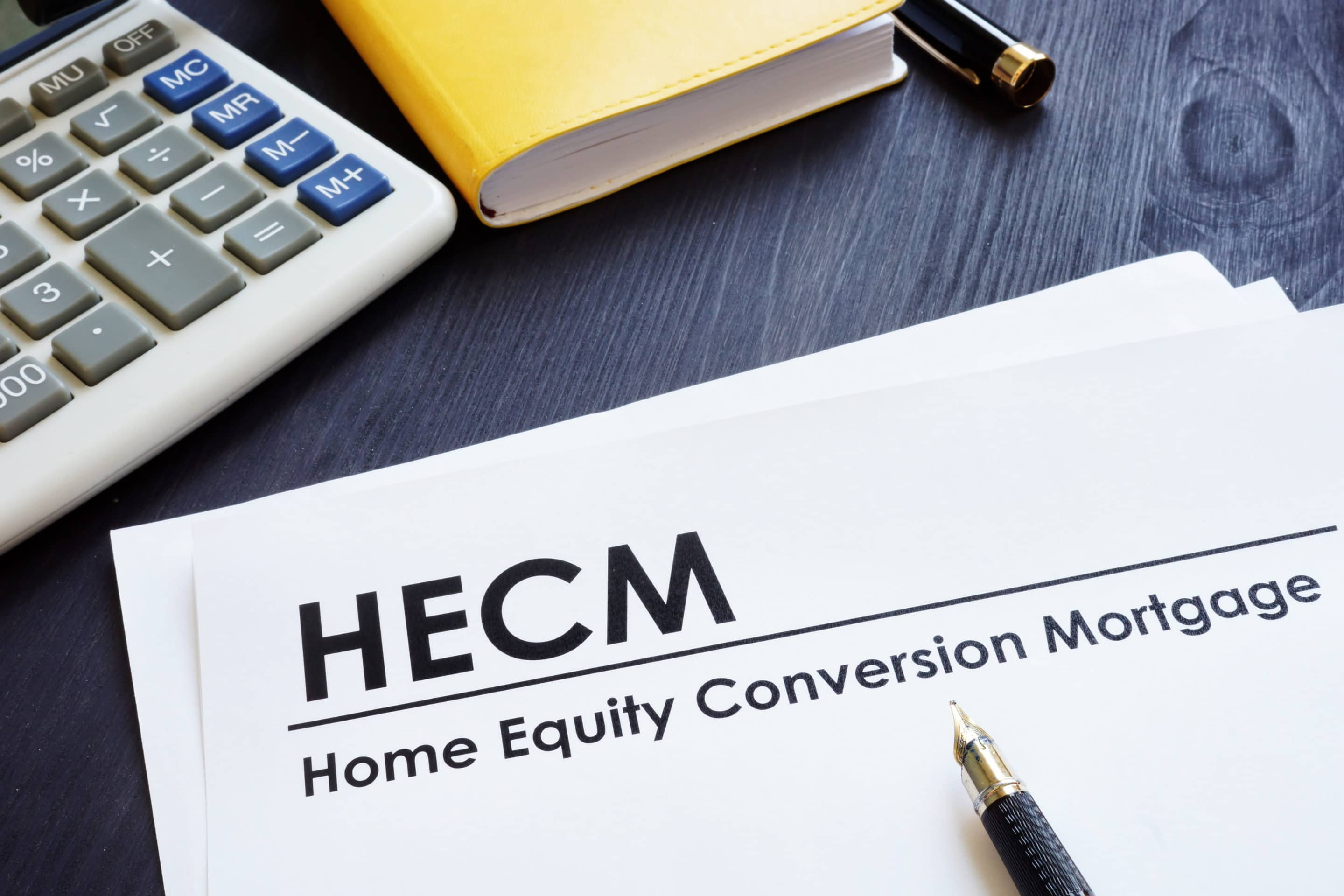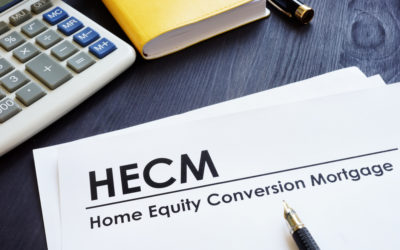As you enter retirement, you may find that a limited income and personal savings are not enough to cover all living expenses. Whether you’d like supplemental income to help pay for medical bills, home repairs, or a dream vacation, a home equity conversion mortgage (HECM) could be the financial tool you’re searching for.
A HECM is commonly known as a reverse mortgage, and the program was created by the U.S. Dept. of Housing and Urban Development (HUD) with senior homeowners in mind. By tapping into a portion of home equity, eligible borrowers can gain access to additional cash flow and finance the cost of living in retirement. Therefore, if you have built a sizeable amount of home equity and are looking to increase your retirement revenue, a HECM may be an incredibly useful tool to capitalize on the wealth you’ve accumulated in your home.
It’s important to be sure that a HECM is the right financial choice for you. Learn more by clicking on a topic below or continue reading for a complete guide on HECM loans.
What is a Home Equity Conversion Mortgage (HECM) Loan?
A home equity conversion mortgage (HECM) is a type of loan insured by the Federal Housing Administration (FHA) that allows eligible borrowers to convert a portion of their home equity into loan proceeds to be used as disposable cash in retirement.
The home is used as collateral, and the loan must be repaid when it reaches a maturity event that signals its Due and Payable status. Until then, borrowers continue living in the home while enjoying the wealth they’ve accumulated in it, without the requirement of monthly repayments.
The funds received from a HECM can be spent on anything—so long as borrowers keep up with property taxes, maintenance, and insurance. However, in order to qualify for a HECM, there are several key requirements that must be met:
- You are 62 years of age or older
- You own a significant amount of equity
- The home is your primary residence
What is the Difference between a HECM and a Traditional Mortgage?
A traditional mortgage is a loan that allows you to borrow money to pay for a home at the time of purchase. Over time, you pay off the borrowed money and accrued interest with the goal of eventually owning your home. With every payment you make, your loan decreases and your equity increases.
Conversely, a HECM allows you to borrow money based on the equity you already have built in your home. According to the U.S. Census Bureau, nearly 80% of seniors own their homes, making it their largest financial asset—and an untapped source of potential retirement income.
Important Features of a Reverse Mortgage
To see if the home equity conversion mortgage program may be the right solution for your retirement needs, you should know its important features:
- Borrowers can access the equity stored in their homes without having to sell the property or vacate the premise. This may be especially helpful for seniors who prefer to age in place.
- HECMs are federally insured, non-recourse loans. This means that if a borrower owes more than what the home is worth, they (or their surviving heirs) will not have to pay the difference; they only repay the balance of the loan or 95% of the home’s appraised value, whichever is less.
- Borrowers are not required to make monthly loan repayments. A HECM loan only becomes Due and Payable when a maturity event is reached.
- A HECM loan can offer borrowers a flexible structure and interest rates, ensuring they find the best fit for their needs.
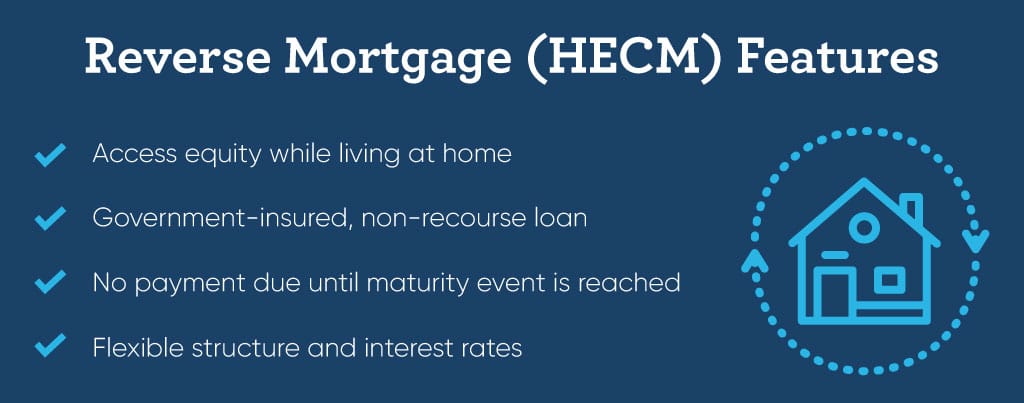
We’ll explain each of these details in the following sections within our guide to reverse mortgages.
How Does the Home Equity Conversion Mortgage Program Work?
When applying for a home equity conversion mortgage, a principal limit (also known as borrowing limit) is determined. The principal limit is based on your age, the interest rate of the loan, and the appraised value of your home.
Note: If you are married or have a co-borrower, the principal limit is based on the age of the youngest co-borrower or eligible non-borrowing spouse.
Typically, older borrowers with high-value homes receiver a higher borrowing limit than younger borrowers with low-value homes. Find out how much you qualify for with our free reverse mortgage calculator.
Once the principal limit has been set and your HECM application is approved, you can then choose the method to receive loan proceeds. There are several options:
Lump sum
- Fixed interest rate
- Receive all available funds at once
- Pay interest and fees on the entire loan amount
Tenure
- Adjustable interest rate
- Equal monthly payments for as long as one of the borrowers lives at home
Term
- Adjustable interest rate
- Equal monthly payments for a fixed number of months
Line of credit
- Adjustable interest rate
- Receive money at times and in the amounts that you choose
- Unused credit grows over time
- Only pay interest on the money you have received. Can be combined with a monthly payout.
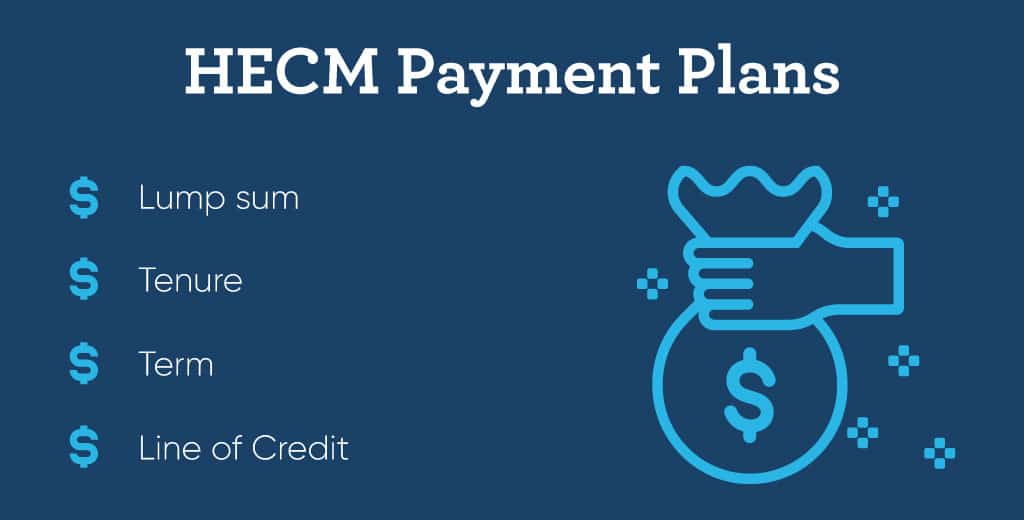
After deciding on a payment method, how you spend the funds is entirely up to you. So long as you meet all your financial responsibilities, you can use the money wherever it benefits you the most.
What are the Advantages of a Home Equity Conversion Mortgage?
Retirement should be a relaxing period of your life, free from financial worries. Many senior homeowners who need supplemental income find that a HECM can be incredibly helpful when other monetary resources are minimal.
Benefits of Using a Reverse Mortgage in Retirement
Below is a list of several reverse mortgage benefits that may apply to your circumstances:
- Pay Off a Traditional Mortgage
It’s common for borrowers to use HECM funds to pay off their mortgages. If you still owe money on your home, you may be able to use a HECM to repay what’s left, saving you from monthly payments on your traditional mortgage.
- Children Can Still Inherit the House
Many borrowers choose to sell their home to pay off a HECM, but your estate can also keep the property when you pass away. After the HECM loan is paid off in full, the house is theirs and any remaining equity belongs to them.
- No Monthly Payments to Drain Savings
Unlike traditional mortgages, you don’t have to make monthly payments on a HECM loan. The loan is paid back in full at the end of the term, giving you the freedom to use the money however you choose. This may be especially helpful for medical emergencies and unexpected costs.
- High Levels of Financial Security
With a home equity conversion mortgage, there’s no chance of your home being taken away for reasons of non-payment. Unless you break the terms of the HECM, you will continue to live in your home and reap the benefits of a supplemental income. Additionally, federal insurance will pay the difference if your loan balance ends up being more than the value of your home when the loan is due.
- Defer Social Security Benefits
Let your Social Security benefits grow while you use the funds from a HECM to cover life’s expenses. With money from a reverse mortgage, you may be able to max out your Social Security payout by delaying the age at which you start taking Social Security payments. Keep in mind that using a HECM loan may affect eligibility for need-based programs such as Medicaid or Supplemental Security Income (SSI).
- Tax-Free Cash Flow
Because a HECM loan is not considered a taxable source of income, loan proceeds are tax-free. Whether you choose to receive monthly payouts or a lump sum, you can enjoy the wealth you’ve accumulated without handing over a large chunk to the government.
- Retain Home Ownership
With a HECM loan, you can continue living in your house throughout retirement. Anyone can live with you while you have a reverse mortgage, and some homeowners choose to sign up with a co-borrower, such as a spouse or partner.

Is a Home Equity Conversion Mortgage Right for You?
From covering costly medicals bills to booking the vacation you deserve, the benefits of a reverse mortgage can be very attractive. However, it’s important to know whether a HECM loan is a viable solution to help you achieve your goals.
You may be an ideal candidate for the home equity conversion mortgage program if:
- You want to maintain your lifestyle in retirement, but do not want to sell your home.
- You cannot qualify for alternative financing methods, such as a HELOC, due to credit issues.
- You would like the comfort of an emergency fund but lack the income to create one.
- You wish to receive health care while living at home.
If this sounds like you, read through the eligibility criteria for a HECM loan to see if you may qualify.
HECM Borrower Qualifications
Before applying for a reverse mortgage, make sure you meet all the requirements. These include:
- Age: You must be at least 62 years old to qualify. If your spouse is under 62, there are still ways for you to get a reverse mortgage.
- Home Equity: You typically need at least 50% equity in your home to qualify.
- Primary Residency: You must live at the home the majority of the year since a HECM can only be used for a primary residency.
- Counseling session: You must complete a mandatory counseling session with an agency that’s been approved by HUD to go over the details of a HECM.
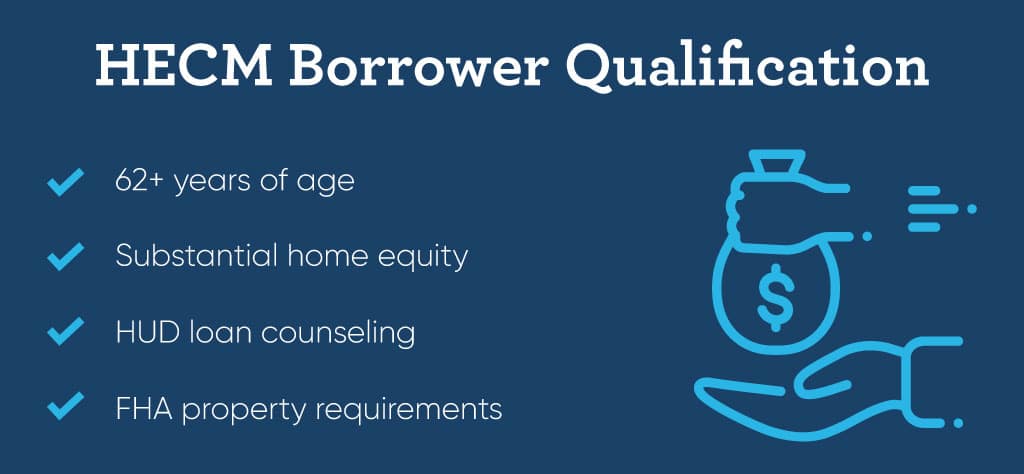
Follow this link to learn more about eligibility requirements for a HECM loan.
HECM Property Qualifications
Not all properties are eligible for a home equity conversion mortgage, so verify whether yours meets the requirements.
- Home Type: Single-family homes, two- to four-unit multi-family homes, and FHA-approved condominiums are all eligible.
- Home Condition: You must complete necessary repairs and upkeep to ensure the property is in good condition.
- Primary Lien: The HECM must be the primary lien on your home, so getting a HECM often means paying off a traditional mortgage.
- Federal Housing Administration (FHA) Standards: Your home must meet all FHA property standards and flood requirements.
HECM Financial Qualifications
In addition to borrower and property qualifications, you need to be aware of the financial responsibilities you will be expected to uphold when you apply for a home equity conversion mortgage. These include:
- Property Taxes: It is essential that you remain current on the real estate taxes of your property throughout the duration of your loan.
- HOA fees: If you have any Homeowners Association fees, these still must be paid throughout the life of your loan.
- Homeowner’s Insurance: Although you will also have mortgage insurance, you still must maintain homeowner’s insurance. If you don’t maintain this, your loan balance could become due earlier than you anticipated.
- Federal Debt: You must not have any delinquent federal debt in order to qualify for a reverse mortgage.
The HECM Application Process
The application process for the reverse mortgage program follows four steps, and GoodLife is here for you throughout the entire process.
- Fill out an Application
When you start with our reverse mortgage calculator, you just need to provide a few simple pieces of information to get the ball rolling on your application. Once you submit your information, one of our loan officers will contact you to talk about different options based on your specific situation. Remember, you may cancel or pause your application anytime during this process.
- Attend a Counseling Session
After submitting an initial application, you have to attend a counseling session approved by HUD. You can complete this session in-person or over the phone—whichever is the easiest for you. This session will provide you with a wide array of information about HECM loans to help you decide whether it is the right financial tool for you.
Once the counselor has gone over how a HECM will affect your estate, heirs, benefit eligibility, and current finances, you can look at the loan comparisons we’ve put together for you. Remember, the counselor is just acting as a helping hand—they won’t recommend any specific action. If you decide a HECM isn’t what you’re looking for, this session can also be used to look at other options to supplement your retirement income.
At the end of the session, you and your counselor will sign a certificate to verify that you’ve completed this component of the application process.
- Get Your House Appraised
Now it’s time to have an independent appraiser visit your home and determine the value of the house. The appraiser must follow HUD guidelines and be approved by the FHA for your application to move forward.
- Underwriting
Next, GoodLife will confirm your ownership of the house with a title search and obtain title insurance. If you have any problems with trusts, liens, or bankruptcies, we’ll work through them with you to ensure we have all the property documentation required to set a closing date.
- Close the Loan
On the closing date, you’ll sign all the final documents to make your Home Equity Conversion Mortgage official—be sure to take your time to review all the details. Your application now goes into a right of rescission period, which means you have up to three business days to cancel your loan after closing. If you decide to withdraw your application during the rescission period, you won’t face any penalties and there will be no questions asked.
- Use Your New Cash Flow
After the rescission period is over, it’s time to start taking steps toward financial freedom. You’ll begin receiving the agreed-upon payments either through a check or through a wire transfer. If you plan to pay off an existing mortgage with your loan, we can send the payment directly to your mortgage lender. If not, you can start using the loan proceeds however you like.

Learn more about the GoodLife HECM application process here.
Loan Costs and Fees for a HECM
GoodLife offers some of the most competitive rates on the market to ensure you’re able to live comfortably in retirement. Typically, there are one-time upfront costs at the beginning of your loan. Origination fees, an initial mortgage insurance premium paid to the FHA, and closing costs are all included in the cost of a HECM.
Borrowers may choose to pay for these fees with the funds from the loan. While this decreases the total amount of money you get to use, it also means that you don’t have to pay out of pocket.
Apart from initial fees, ongoing interest is added to your loan balance each month. Interest, servicing fees, and mortgage insurance premiums are added each month, and interest accrues on the previous month’s balance.
Mortgage insurance guarantees you’ll receive all agreed-upon payments, and if your loan balance ends up being more than your home is worth, the insurance will cover the difference.
Helpful HECM Glossary
Browse our list of useful definitions of terms you may encounter during your research on the home equity conversion mortgage.
- Appraisal
An appraisal is when a certified appraiser determines the value of your home. This is a process that is required in order to receive a reverse mortgage.
- Co-borrower
In terms of a home equity conversion mortgage, a co-borrower is a spouse or partner who is also responsible for the loan. They will receive the payments and benefits of the loan, even if you no longer live at the house.
- Credit line growth
When you borrow from your HECM loan on an adjustable interest rate, your credit limit will grow over time based on the amount of unused credit. Your credit line growth is based on your mortgage insurance premium and interest rate.
- Equity
As you pay off the traditional mortgage you acquired to buy your house, you gain equity, or ownership, of the house. If your house is worth $200,000 and you still have $50,000 of mortgage debt to pay off, you have $150,000 in equity.
- FHA
The Federal Housing Administration is a government agency which sets standards for construction and underwriting, and also insures loans made by banks or lenders for home building. The mortgage insurance you need to acquire for a HECM will be secured by the FHA.
- HELOC
A Home Equity Line of Credit (HELOC) is a revolving line of credit secured by your home where funds are replenished once they’re paid off, much like a credit card. This is not the same as a HECM—be sure you fully understand which financial tool you are applying for before pursuing an application.
- HUD
The Department of Housing and Urban Development is a section of the U.S. government that creates policies around housing and city planning. HUD regulates many aspects of reverse mortgages, including which agencies are certified to deliver your counseling session during the application process.
- Primary residence
You can only receive a HECM for the property you live in for most of the year, also known as your primary residence.
- Principal limit
A principal limit is also called a borrowing limit. This indicates how much money you’ll be able to receive from a HECM loan. Your age, value of your home, and the interest rate on your loan are all taken into account when the principal limit is determined.
- Rescission period
After closing on a HECM loan, you have a grace period—or rescission period—of three days to cancel the application. No penalties will be incurred if you decide to cancel.
- Upfront costs
When you open a HECM, you will have to pay various upfront costs. These include mortgage insurance premiums and various fees, which can be paid either out of pocket or with the funds secured by the loan.
Conclusion
At the end of the day, we are here to help you determine whether a home equity conversion mortgage is the right financial tool for your retirement goals. We’re committed to helping seniors achieve The GoodLife in Retirement; if you have further questions or are ready to apply for a HECM loan, contact one of our Reverse Mortgage Specialists at any time.
Sources:

 1-866-840-0279
1-866-840-0279
